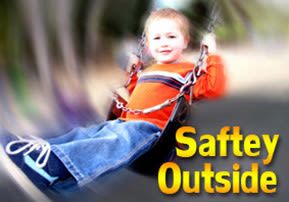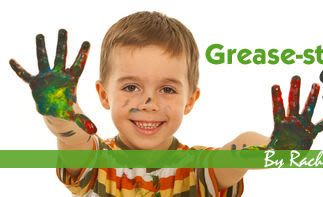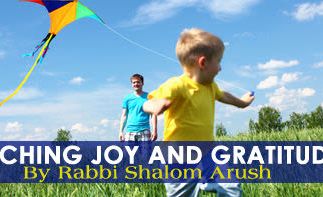
Safety Outside
As children start to go outside the house, they become exposed to many new dangers - in the street, the playground and everywhere else...

As children start to go outside the house, they become exposed to many new dangers – in the street, the playground and everywhere else. Children’s ability to estimate dangers and their seriousness is usually limited. When small children are outside they must be under constant supervision. The older and more independent they become, it is our parental duty to teach them about common dangers and how to guard against them. As soon as children enter an educational framework, the teachers and educators must take their share in supervising the children, and they too must train and guide the children in their care to take care and avoid danger.
In the playground
Playing outside is an important and healthy activity that greatly contributes to children’s development. The more they grow, the more they use their bodies to run, jump, climb… We should give them every encouragement, as this is how they gain strength and develop their coordination and other skills and abilities. At the same time, we need to watch over them to ensure that they do not put themselves in danger or endanger others. We should teach them to use playground equipment properly, not to push other children, and to watch how and where they are jumping and running.
Not only must we teach children to play carefully and avoid danger in the playground. It is also most important to help them develop a responsible attitude towards what belongs to others, and especially towards public property. Children benefit from the playground and the equipment: it is forbidden to destroy them!
Similarly, children should be taught not to throw litter and to take care to keep public places clean just as we keep our homes clean.
Exposure to the sun
“A sun of righteousness with healing in its wings” (Malachi 3:20). The rays of the sun have healing qualities. At the same time, excessive exposure to the sun can cause serious damage to the skin and even cancer. Too much sun can also cause dehydration and sunstroke. Parents must keep children from exposure to the sun on hot days and especially during the hottest hours of the day. When children go out into the open they should be equipped with suitable clothing and sun hats as well as sufficient drink.
Safety on the roads
“All roads are likely to be places of danger” (Yerushalmi Brachos 4, 4).
Our Sages’ rule that all roads must be considered dangerous is more applicable today than at any other time. Accidents are one of the leading causes of death and injury in the world. Parents must repeat to their children over and over again, from the earliest age, that the road is a very dangerous place. When parents have occasion to take their children on the street, where they see cars, traffic lights, pedestrian crossings and so on, this is a good time to give children practical education in safety precautions on the streets and roads and dangers they must be aware of.
Even after teaching children the rules of road safety, we must be certain they follow them in practice before we allow them to cross the road alone. This rule certainly applies to parents who allow their children to ride on bicycles. Never take risks!
The main rules we must repeatedly instill in children are:
1. Any place where there are moving cars is a place of possible danger.
2. It is forbidden to run out into the road.
3. The sidewalk is not a place to play, and certainly not the road.
4. Cross the road only at a green light or pedestrian crossing. Small children who have to cross the road should ask help from an adult.
5. When children step down from the school bus, they must immediately move onto the sidewalk and wait until the school bus moves off and drives away. Never stand in front of or behind a car as the driver may drive the car forwards or backwards without seeing the child.
6. While teaching our children all the necessary safety precautions on the streets and roads, we must also instill them with a deep awareness that the first step on leaving the house to go out must be to turn to the Creator of the World to ask His protection from all danger.
When the children enter an educational framework, parents must work in conjunction with their children’s teachers to see that the children are thoroughly trained in all aspects of road safety, with regular reviews of all the main rules. Today’s leading rabbis have given their full support and encouragement to this endeavor. Responsibility for children’s education in road safety lies not only with parents and teachers but also with adult pedestrians and drivers in general. When adults serve as living examples of proper care on the roads, children will learn from them and follow their example, thereby avoiding many accidents.
Caution with strangers
On today’s streets it is not only the cars that are dangerous. There are also dangerous people, and children should be taught basic rules of caution:
1. Small children must not talk to strangers or take something from them. They must not go off in their company and certainly never get into a stranger’s car. Children should be taught to keep well away from strangers. They should be taught that if a stranger should ever take hold of them and try to take them, they should do everything in their power to get away. They should have no shame about shouting and screaming and making as much noise as possible in order to attract someone’s attention.
2. In the event of a suspicious object, children should be taught to keep well away and to call an adult for help. It is desirable to teach children not to pick up toys or other objects thrown in the street.
Smoking
Many of the hazards we have discussed so far pose an immediate danger to our children and are likely to encounter every day in the house and outside. Parents of small children may consider smoking a remote problem – and so may it always remain. But the truth is that smoking is not such a far off risk. Children are often exposed to smokers and cigarette smoke. Unfortunately our children often see adults smoking, and among them, people they are taught to respect. This may encourage them to think smoking is not such a serious problem.
The dangers of smoking and its results have been known for years. Smoking causes damage to the lungs and heart and general health. Not only is smoking a waste of precious money, it also causes an unpleasant odor on the smoker’s mouth and clothes and gives his teeth and hands an unsightly appearance. Recent research proves beyond all doubt that the harm caused by inhaling other people’s cigarette smoke (“passive smoking”) is as great as the harm caused to the smokers themselves.
Doctors are unanimously opposed to smoking. In all advanced countries, health regulations require that cigarette packs must carry a warning that smoking is dangerous to health… Yet in spite of everything, smoking is very widespread. Every year the ranks of smokers are swelled by tens of thousands of new smokers, most of them young. The mere sight of adults smoking encourages many young people (and even children) to start smoking, some out of curiosity, others because of a desire to assert their independence, to show how old they are or make an impression on their peers, or as a sign of rebellion. Unfortunately, Purim has turned into a time for children to try smoking, and from there it’s often a short road to regular smoking.
Education against smoking should start from a young age. Just as we inoculate small children against dangerous diseases, so we should find ways to “immunize” our children against the temptation to smoke long before they are exposed to it. When parents are with their children and come across people who are smoking, this can be an opportunity to explain to the children that this is not a good habit and that smoking damages people’s health. Some parents specify the damage that can be caused by smoking in detail in order to foster an aversion for the habit in their children.
As a general rule, children must understand that their parents are clear and unwavering in their opposition to smoking as well as to alcohol consumption and all other forms of substance abuse. At the same time, parents must be open and willing to answer their children’s questions about these subjects. Parents should keep careful watch on their children’s behavior. Especially as they grow older, parents should be alert to any unusual mood changes, and encourage them to talk openly, heart-to-heart.
“You shall make a parapet”
“When you build a new house, you shall make a parapet for your roof, and you must not put blood upon your house, for someone might fall” (Deuteronomy 22:8).
It is true that God watches over the details of people’s lives and knows all their deeds and everything that is going to happen to them for good or bad according to His decree and His command in accordance with their merits or their guilt. As our Sages of blessed memory have said (Hulin 7a): “Nobody so much as knocks his finger in the lower world unless it is first announced in the upper world.” At the same time, each person has a duty to protect himself against the chances of nature, for God created His world and built its foundations on the pillars of nature. He decreed that fire burns, while water puts out the blaze. Similarly, it inevitable by the laws of nature that if a large stone falls on someone’s head, it will smash his brain, or if a person falls from the top of a high roof to the ground, he will die. The Holy One, blessed be He, has given men the gift of their bodies and has breathed into each one’s nostrils the soul of life, a soul gifted with the intelligence to protect the body from all harm. He has put the two of them – the soul and the body – under the wheel of nature and subjected them to its elements, which they are able to control and direct in order to accomplish what they need. Since God has put man’s body under the rule of nature – for so His wisdom required, since man is a material being – He therefore commanded him to protect himself from natural dangers. For nature, into whose hands he has been given, will do what it is made to do against him if he will not protect himself from it. (Sefer HaHinuch Mitzvah #546).
To be continued.
***
With permission from www.azamra.org












Tell us what you think!
Thank you for your comment!
It will be published after approval by the Editor.